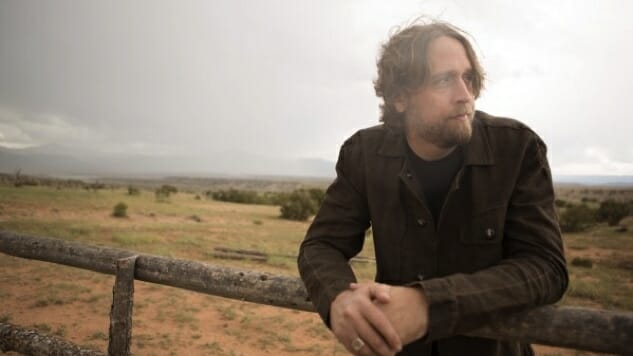Hayes Carll: It Is What It Is and It Ain’t What It Ain’t
Photo by David McClister
Hayes Carll’s 2011 album KMAG YOYO was his commercial breakthrough, rising to #12 on Billboard’s Country Album chart. As he toured behind that album, his confidence grew with the size of the crowds. For a memorable show at Threadgill’s Beer Garden in Austin, he fronted a crackerjack sextet as he belted out his country-rock singalong, “Stomp and Holler,” with all the swagger the song required.
With his light-brown hair parted in the middle and a sparse beard framing his jaw, he wore a blue work shirt and a sly grin. That grin made it clear that his tongue was in his cheek when he complained that it was “Hard Out Here” on the road. The smile seemed more genuine when he exclaimed that he was living the “Drunken Poet’s Dream.”
It seemed as if he were on the cusp of stardom, but in reality his world was falling apart. His marriage was collapsing, and he was developing unhealthy habits on tour. It would be more than five years before he released his next recording, and by then all his commercial momentum was gone. On the other hand, Lovers and Leavers was his most ambitious and impressive project yet, tackling subjects such as divorce, fatherhood, self-medication and mortality with sobering smarts. “Good While It Lasted” is as devastating a song of loss and acceptance as you’re likely to hear.
Before he could get to the point of releasing his new album What It Is, out tomorrow, he had to solve three challenges. He had to straighten out his personal life so he wouldn’t plunge back into personal turmoil (contrary to glib opinion, you’re not required to suffer for your art). He had to establish regular work habits so he wouldn’t go another five years between albums again. And he had to find a way to balance what his fans liked about KMAG YOYO, while retaining what he liked about Lovers and Leavers.
He settled things on the home front by not only getting engaged to Alison Moorer (Shelby Lynne’s sister, Steve Earle’s ex-wife and a major artist in her own right) but also enlisting her as a co-writer and co-producer on the new album. He settled things on the work front by using the Patreon crowd-funding site to launch a song-of-the-month campaign. That allowed him to find the proper balance between “Stomp and Holler” and “Good While It Lasted” one song at a time.
“I was interested in recording music on a regular basis rather than once every few years,” Carll explains. “This gave me the opportunity to go into the studio with a new song every month. It gave me a lot of freedom without worrying how it was going to affect the rest of my career. After five years without a record, there was a lot of pressure Lovers and Leavers. With Patreon, there was no pressure. These songs weren’t going out to the media or to the world at large. On the other hand, these weren’t home demos; these were studio recordings.”
The advantages of this approach are obvious. If only a few hundred subscribers are going to hear the results, you can take a lot more chances—in both the songwriting and the production. If something worked, great; you could apply those lessons to the final version on the album. If something didn’t work, you weren’t going to get nailed by the press. The mistake wouldn’t be permanently locked into your official discography.
“It was cool for me, because I could do a reggae song or a punk song if I wanted to,” Carll says. “I could work with all these producers I’d always wanted to work with—Charlie Sexton, John Evan, Adam Landry and more. I would write a song, find a producer, go record it. But rather than put it out to the public in general, I would release it to the 400 people who had paid to join—they got to hear music no one else was going to hear. I released 14 or 15 songs on Patreon, and 10 of them are on the new album in different, re-recorded versions.”
A good example is “Things You Don’t Wanna Know,” which Carll co-wrote with Charlie Mars. The lyrics describe the common phenomenon: family, friends and lovers may insist they want to hear the truth, but often they really don’t. What makes the song work is the way is gently mocks such hypocrisy, while acknowledging what a drag it is. As such, it carefully treads the boundary between jokey and serious, between the templates of KMAG YOYO and Lovers and Leavers. To find an arrangement that walked the same line, he recorded the Patreon version with John Leventhal, Rosanne Cash’s husband and producer.
“John played every instrument,” Carll explains, “and came up with a lot of cool parts. I really liked that, so when we had a full band and more resources for the album version, we asked ourselves, ‘What do we like about this? What do we want to change?’” They ended up translating some of Leventhal’s parts to B-3 organ and saxophone. The final version allows the refrain, “Maybe you should stop asking ’bout things you don’t wanna know,” to sting a little even as it gets a laugh.
“Jesus & Elvis” grew out of the first-ever co-writing session involving Carll, Moorer and Moorer’s pal Matraca Berg. Berg suggested the title, and Carll suggested that the story be set in Lala’s Little Nugget, a North Austin dive bar he used to frequent. Velvet paintings of Christ and Presley might hang behind the bar, as they often do in Texas.
-

-

-

-

-

-

-

-

-

-

-

-

-

-

-

-

-

-

-

-

-

-

-

-

-

-

-

-

-

-

-

-

-

-

-

-

-

-

-

-








































